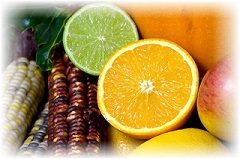
Sweetest Dose of Antioxidant
Do you have a sufficient dose of antioxidants for the day?
I used to complain a lot about being tired. It wasn't funny when you were not even in the thirties and already feeling like an old seventy year-old lady. I wasn't suffering from any illness or encountering any sleeping problems. I didn't have to perform any physically laborious tasks or do any vigorous exercise in the day but near evening I would already feel that my bones were falling apart and my body crumbling down.
Worse, I had frequent bouts of colds, cough, and flu which often took a while to go off. For many years, I went through those awful moments and didn't understand why until I started to introduce a daily dose of antioxidants into my diet through honey water and fresh raw fruit and vegetable juices. It was only gradually did I realise that I needed a good supply of antioxidants to fight my continual lethargy and fatigue, and to ward off those cold and flu bugs.

Antioxidants counter the degenerating activity process whereby fats in food react with oxygen and cause the development of free radicals that are harmful to the body. Free radicals are highly reactive compounds created in the body during normal metabolic functions or introduced from the environment (e.g air pollution, radiation). They are believed to be linked to the development of in more than sixty different health conditions and degenerative diseases, including fast aging, heart disease, Alzheimer's disease, Parkinson's disease, and cancer. What happens here is that the free radicals can alter the structure of genetic material in cells, the DNA, causing the damaged cells to become potentially cancerous. A sufficient intake of antioxidants is essential to combat against free radicals and ultimately, many different degenerative diseases.
Antioxidants, being positive elements work in several ways: they reduce the energy of the free radical, stop the free radical from forming in the first place, or interrupt an oxidizing chain reaction to minimize the damage caused by free radicals. The body produces several antibacterial enzymes that neutralize many types of free radicals. However, these enzymes may not be enough if an excessive amount of free radicals is present (e.g when a person smokes or is frequently exposed to cigarette smoke, when one is under tremendous pressure at work, or when one is suffering from chronic diseases). Supplements of these enzymes are available for oral administration. Many vitamins and minerals act as antibacterial in their own right, such as vitamin C, vitamin E. Consuming these in the form of fruits, vegetables, and herbs may be the best way to provide the body with the most complete protection against free radical damage.
When I started using raw honey in my diet, I found that it is more than a sweet, sticky stuff you put on toast or drop into hot tea; it is a source of cholesterol-fighting antioxidants in a highly palatable form. Research has shown that the antioxidant activity of honey is comparable to that of many fruits and vegetables. And unique to honey is pinocembrin, an anti-oxidant associated with improved brain functioning.
While you are not likely to drink down a cup of honey, the golden liquid may be a wise alternative to sugar and a pleasant way to supplement your diet with anti-oxidants. Honey derives its antibacterial activity from hydrogen peroxide, which is produced by its natural enzyme.

However, studies show that not all honey species are the same. UMF Manuka honey is exceptionally high in its antibacterial strength level. The color of honey hints at its anti-oxidant capacity. Dark-colored honeys typically contain more anti-oxidants than do lighter varieties, and hence better in protecting the body against free radicals. For instance, buckwheat honey has 5.5 times more anti-oxidating strength than the very light acacia variety, and it compares favorably pretty much with the ascorbic acid-related anti-oxidant content of tomatoes. Color also indicates mineral content, which ranges from 0.04 percent in pale honeys to 0.2 percent in some dark ones. Other factors that can influence anti-oxidant content, particularly within a species, are climate, soil, processing, handling and storage. Thus, sweet-clover honey, though fairly light, is also rich in anti-oxidants.
End of "Sweetest Dose of Antioxidant". Back to Honey Properties